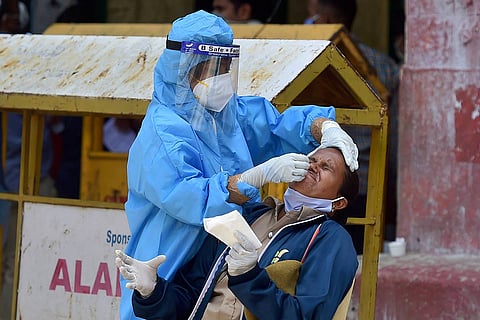

Bengaluru has recorded a total of 51091 coronavirus cases, as of July 29 with 91% of COVID-19 patients being diagnosed this month alone. Presently, the city has 36224 active cases. However, even as Karnataka’s capital city has emerged as a hotspot, the question is - are health officials in the city testing enough people for coronavirus?
The question arises due to a high positivity rate observed in Bengaluru - 17.19% as of July 28. However, an analysis of data over the past week shows that city’s testing has fluctuated considerably over the past week.
The Bruhat Bengaluru Mahanagara Palike (BBMP) plans to address this by increasing testing in Bengaluru and on Tuesday, the civic body announced a plan to conduct free testing in the city.
“In order to control the spread of coronavirus, BBMP has arranged free testing facilities in almost every ward,” BBMP said in a statement by its Commissioner Manjunath Prasad.
“Early detection of coronavirus will help us stop its spread to others...Please do not be afraid of getting tested as majority of the people who get tested at early stages recover very fast,” the statement added. It also included the phone numbers of testing centres in different zones in the city.
Experts agreed that the testing numbers in Bengaluru needed to be increased in view of the rising number of cases.
Dr Giridhar Babu an epidemiologist with the Public Health Foundation of India, who is part of expert committees formed by both in state and Centre is of the opinion that testing should be five times the number of samples tested currently.
He said, "We should be looking at an ideal positivity rate of 5% as recommended by the WHO. Also for testing we can't look at the numbers from a state or a city level. Rather there should be targets set on a ward basis as otherwise it would give a wrong impression that some areas are safer than others without any evidence."
Dr Sanjiv Lewin, Chief of Medical Services, St John's Medical College, says that the rising number of COVID-19 cases in Bengaluru means that there is a need for more targeted testing in the city. “We should be testing everybody in communities where positive cases are found. I would suggest randomised testing in localities with COVID-19 cases. The reluctance of public to test themselves due to stigma and discrimination is something that the government should change,” Sanjiv says.
He also adds that there should be blanket testing of patients in Bengaluru’s hospitals. “I would recommend mandatory testing for everyone getting hospitalised. This is when patients are hospitalised for any reason because it will help protect healthcare workers from getting exposed to the virus,” Sanjiv says.
BBMP is also grappling with issues of patients registering with fake phone numbers and addresses. The civic body has introduced an OTP mechanism to ensure that there is no room for errors in entering the data or patients giving fake contact details while giving their samples for testing.